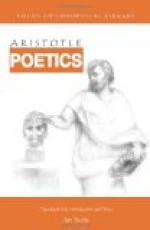V
Comedy is, as we have said, an imitation of characters of a lower type, not, however, in the full sense of the word bad, the Ludicrous being merely a subdivision of the ugly. It consists in some defect or ugliness which is not painful or destructive. To take an obvious example, the comic mask is ugly and distorted, but does not imply pain.
The successive changes through which Tragedy passed, and the authors of these changes, are well known, whereas Comedy has had no history, because it was not at first treated seriously. It was late before the Archon granted a comic chorus to a poet; the performers were till then voluntary. Comedy had already taken definite shape when comic poets, distinctively so called, are heard of. Who furnished it with masks, or prologues, or increased the number of actors,—these and other similar details remain unknown. As for the plot, it came originally from Sicily; but of Athenian writers Crates was the first who, abandoning the ‘iambic’ or lampooning form, generalised his themes and plots.
Epic poetry agrees with Tragedy in so far as it is an imitation in verse of characters of a higher type. They differ, in that Epic poetry admits but one kind of metre, and is narrative in form. They differ, again, in their length: for Tragedy endeavours, as far as possible, to confine itself to a single revolution of the sun, or but slightly to exceed this limit; whereas the Epic action has no limits of time. This, then, is a second point of difference; though at first the same freedom was admitted in Tragedy as in Epic poetry.
Of their constituent parts some are common to both, some peculiar to Tragedy, whoever, therefore, knows what is good or bad Tragedy, knows also about Epic poetry. All the elements of an Epic poem are found in Tragedy, but the elements of a Tragedy are not all found in the Epic poem.
VI
Of the poetry which imitates in hexameter verse, and of Comedy, we will speak hereafter. Let us now discuss Tragedy, resuming its formal definition, as resulting from what has been already said.
Tragedy, then, is an imitation of an action that is serious, complete, and of a certain magnitude; in language embellished with each kind of artistic ornament, the several kinds being found in separate parts of the play; in the form of action, not of narrative; through pity and fear effecting the proper purgation of these emotions. By ’language embellished,’ I mean language into which rhythm, ‘harmony,’ and song enter. By ‘the several kinds in separate parts,’ I mean, that some parts are rendered through the medium of verse alone, others again with the aid of song.




